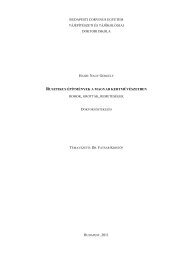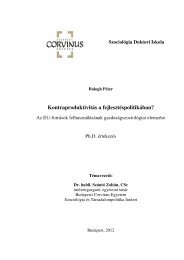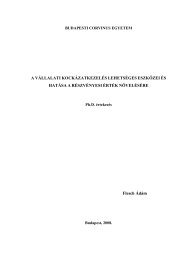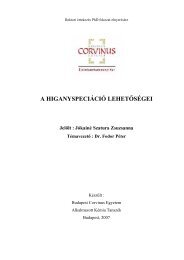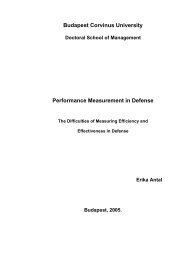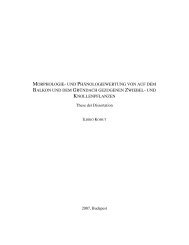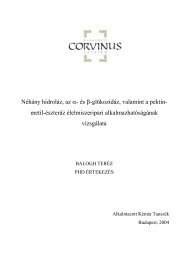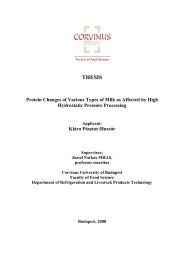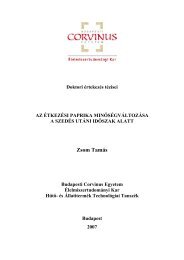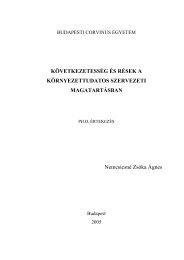THESES OF PH.D. DISSERTATION Barbara JENES
THESES OF PH.D. DISSERTATION Barbara JENES
THESES OF PH.D. DISSERTATION Barbara JENES
You also want an ePaper? Increase the reach of your titles
YUMPU automatically turns print PDFs into web optimized ePapers that Google loves.
4.2. Main conclusions of the dissertation<br />
The results of the doctoral research confirm the complex model of country image, country<br />
equity and destination evaluation as well as the combination of the three constructs.<br />
Country image can indeed be defined as an explanatory variable for determining<br />
country equity and equally for destination rating, in accordance with the results of previous<br />
studies (Nadeau et.al., 2008; Pappu – Quester, 2010). At the same time, these studies all rated<br />
the models of the different sub-fields separately and used own or adapted scales. Some major<br />
result of the present study are the use of scales specifically adapted to the subject, the study of<br />
all sub-fields within one comprehensive model and the use (and confirmed importance of the<br />
use) of theoretical variables.<br />
The model includes six main variables into the research model and all six were revealed to<br />
be of significant effect. The doctoral research was led to a joint study of the aforementioned<br />
three fields by the recognition of the lack of the related theoretical background and an aim to<br />
explore this unstudied area. The ultimate goal of the present doctoral dissertation was to<br />
design a model suitable to be used in a wide context that is able to empirically test the<br />
theoretically validated elements from the literature. The doctoral research therefore acts as<br />
a first elaboration and test of a Country Equity Model (CEM) in the context of<br />
destinations.<br />
To answer our main research question (What factors influence the rating and measuring of<br />
country image and country brand, with special regard to the field of destination evaluation?),<br />
our research did confirm that the dimensions of country equity do have a determining effect<br />
on destination evaluation. Results confirm that the country equity model (CEM) provides<br />
a useful theoretical framework for the study and interpretation of country image and<br />
destination evaluation.<br />
The approach according to which country image is an element and not an antecedent of<br />
country equity was further tested before being accepted. The validated dimensions of the<br />
country equity construct are as follows: country image, country awareness, country<br />
associations, country loyalty. Given that previous studies of country image and country<br />
equity have not studied in a complex manner the relationships between these dimensions, our<br />
results account for an important indication as to the future potential use of these.<br />
The development and foundation of an extended approach to the concept of brand equity<br />
marks another significant theoretical contribution. Previous analyses on country equity mostly<br />
considered the concept in a country-of-origin context by expressing the value of a country<br />
brand through products’ brand equity. The present dissertation gets ahead of this approach<br />
and argues that country brands have a raison d’être beyond being a part of product brand<br />
equity, on their own, and that the value of a country as a brand can be expressed the same way<br />
a consumer brand’s value can be.<br />
16



